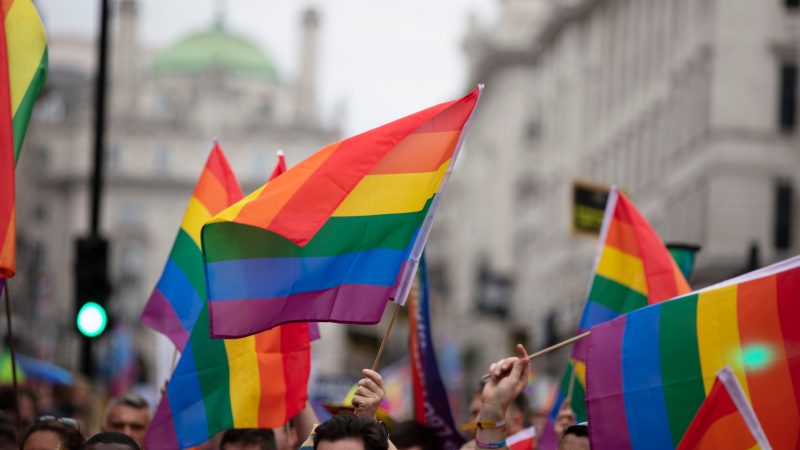
As families around the country grapple with home learning during the coronavirus pandemic, LGBT+ History Month offers an opportunity for both parents and children to find out more about sexual orientation and gender identity. Claiming our history, celebrating our presence and creating our future are empowering aspects of LGBT+ History Month, marked in February each year. The knowledge and solidarity flowing from the initiative can be empowering for young people, and the absence of it is isolating and can have serious consequences.
Growing up before LGBT+ History Month came to fruition, I know of the sorrow caused by restricted education and so-called traditional values. Having navigated this terrain in later life, I understand how information and sharing can be transformative. The campaign to ‘Educate Out Prejudice’ was initiated in 1974 following the sacking of a London teacher who was outed by a student. It was given renewed clarity and impetus in 2003 when the Labour government put in place the Employment Equality (Sexual Orientation) Regulations 2003, which abolished the infamous Section 28 that “prohibited promotion of homosexuality by local authorities”.
Attempting to defend this anti-gay provision in the Local Government Act 1988, Margaret Thatcher said: “Children who need to be taught to respect traditional moral values are being taught that they have an inalienable right to be gay. All of those children are being cheated of a sound start in life.” Thatcher could not have been more wrong. Denying liberty of expression and blocking children from understanding their identity stifled life chances. The evidence shows that young people denied support and treatment for gender identity self-harm and some tragically turn to suicide. We also know when lesbian and gay people ‘come out’ at work, their productivity improves.
Activists across the labour and trade union movement have challenged deep prejudice of this kind. Changing laws like Section 28 was critical. Educating people was just as essential. We need both structural and cultural change. That is why changing the law by scrapping Section 28, as well as resources being developed by Schools Out and other organisations, has helped make the national curriculum more relevant to LGBT+ lives. This year, the focus will be on personal, social, health and economic (PSHE) education with the theme of ‘body, mind and spirit’.
In previous years, attention has been given to these issues in the classroom. The pandemic means that more conversations will happen around the kitchen table, providing an opportunity for children and parents alike to learn and be open. But young people in less enlightened households may feel more repressed and consequently at greater risk. With a backlash against trans rights in recent years, I feel growing concern for trans and non-binary young people. Attitudes are hardening against gender transition, including withholding puberty blockers from teenagers as well as dismissing those who identify differently from the male/female binary. The media gives voice to transphobia, sometimes encouraged by politicians intent on a culture war.
More than ever, this is a time for coming together. It is why a group of Labour trans equality activists have responded by creating a new campaign network. Labour Trans Equality has been formed by three former Labour parliamentary candidates, a few known trans Labour trans councillors and other experienced activists to raise awareness across our movement. It aims to shape policy with a manifesto, develop a definition of transphobia, create training resources and support trans people to secure political office. We are encouraged by the recent election of Sarah McBride in Delaware in the US, becoming the first trans state senator, showing how trans people can lead in the mainstream.
We want Labour’s leadership to be more trans confident and our party more inclusive. In recent times, we have not felt so well assured, even within LGBT+ Labour. Just in recent days, Heather Peto, the first trans woman to be a co-chair of LGBT+ Labour, resigned because she felt unable to navigate cisgender barriers and control. LGBT+ solidarity within Labour may have fractured, inhibiting our collective endeavour. Division only serves the anti-trans lobby. We need to find a way through and hear from our allies. It feels like a delicate moment, which reminds me of the words of Martin Luther King: “In the end, we will remember not the words of our enemies, but the silence of our friends.”
Labour can be proud of accomplishments on LGBT+ policy in the past, including passing the Gender Recognition Act 2004. Yet there is much discord at present that needs resolving. We must move on by claiming a different future that includes simplifying gender identity rules, improving access to vital healthcare and tackling economic inequality faced by many trans people. We have possibilities ahead, just as Joe Biden as showed within days of becoming US President by reversing Donald Trump’s anti-trans laws. Biden has also nominated Rachel Levine, Pennsylvania Health Secretary, who is set to become the first trans federal official to be approved by the Senate. The highly experienced paediatrician will play a leading role in tackling coronavirus across America. This is the kind of commitment UK trans people want from Keir Starmer – promoting trans equality and representation, challenging transphobia and shaping policy to demonstrate ‘Labour out and proud’.




More from LabourList
‘Labour must confront the crisis of first past the post before it’s too late’
Unite to debate affiliation with Labour Party at conference next year
Miliband tops LabourList Cabinet league table, with gender divide in PM approval